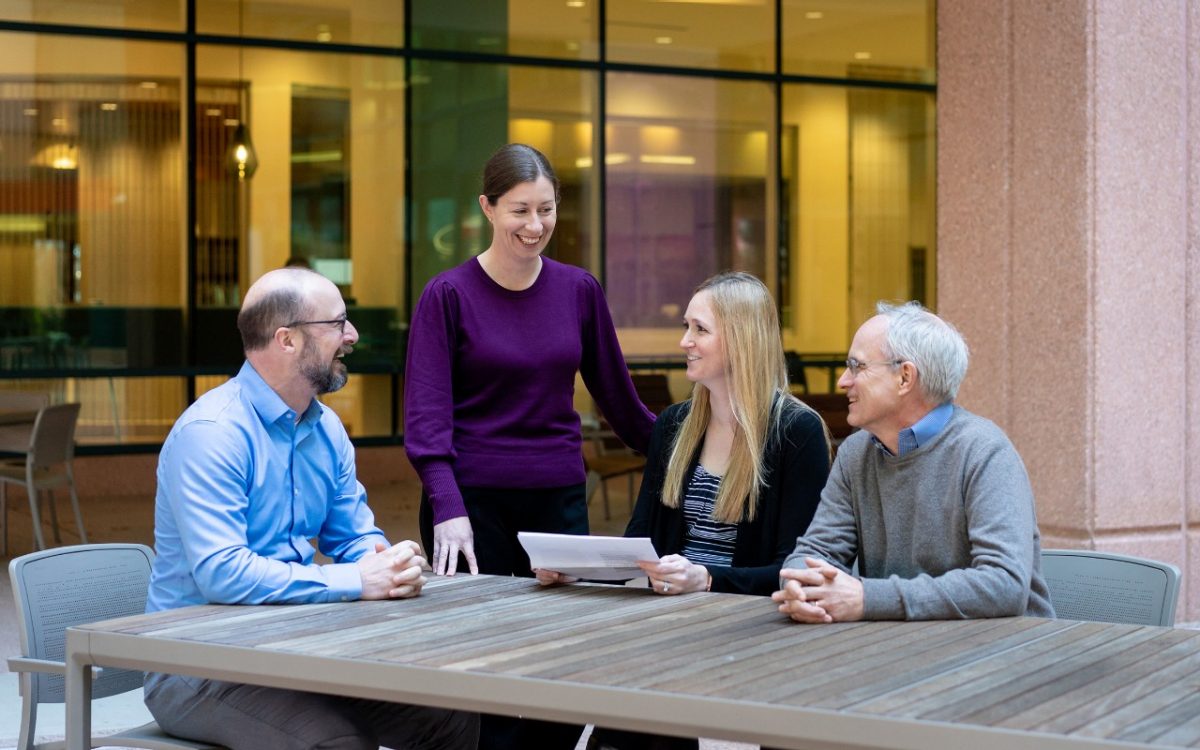
L to R: Benjamin Youngblood, Ph.D.; Aimee Talleur, M.D.; Caitlin Zebley, M.D., Ph.D.; and Stephen Gottschalk, M.D.
St. Jude Children's Research Hospital is testing a treatment for cancer called a chimeric antigen receptor (CAR) T cell. T cells are a kind of immune cell. They help fight infections and diseases such as cancer. Scientists wanted to know what controls T cells' staying power. Their findings were published today in Cell Reports.
The scientists used samples from a clinical trial called SJCAR19, the first investigator-initiated CAR T-cell therapy study at St. Jude, which is led by study author Aimee Talleur, M.D., St. Jude Department of Bone Marrow Transplantation and Cellular Therapy. Using this clinical data, the researchers were able to determine why CAR T-cell therapy's effect wanes over time.
T cells get tired. When that happens, the immune system's anti-cancer response is limited. Scientists have debated whether it is the persistence of T cells or their exhaustion that stops CAR T-cell therapies from working.
"The field has focused on the idea of getting the CAR T cells to stick around longer, but we've shown that presence isn't enough; they need to be active," said first and co-corresponding author Caitlin Zebley, M.D., Ph.D., St. Jude Department of Bone Marrow Transplantation and Cellular Therapy. "In this study, our DNA methylation profiling of the CAR T cells prior to infusion demonstrates that we can use epigenetic tools to predict which patients' cells will expand to fight tumor."
The scientists showed that an epigenetic program controls the T cell's exhaustion. Epigenetics refers to stable changes to the gene that effects its expression. This finding may be missed if only looking at transcriptional profiling.
"This work documents the epigenetic programs that are acquired during manufacturing and the clinical response of CAR T cells," said co-corresponding author Benjamin Youngblood, Ph.D., St. Jude Department of Immunology. "We used insights into epigenetic programs, gained from our lab's prior studies, to assess the effect of these programs on patient cells following treatment, which hasn't been done before."
"The study presents a prime example of 'reverse translation,' in which samples from a clinical study are used to provide mechanistic insights into clinical observations," said Stephen Gottschalk, M.D., St. Jude Department of Bone Marrow Transplantation and Cellular Therapy chair. "It would not have been possible without our Center for Translational Immunology and Immunotherapy, which is a joint endeavor between the Departments of Immunology and Bone Marrow Transplantation and Cellular Therapy to conduct these types of studies."
The study's other authors are Giovanni Galletti and Enrico Lugli, Laboratory of Translational Immunology, Humanitas Clinical and Research Center in Milan, Italy; and Charmaine Brown, Tian Mi, Yiping Fan, Shanta Alli, Shannon Boi, Deanne Langfitt, Jean-Yves Metais, Timothy Lockey, Michael Meagher and Brandon Triplett of St. Jude.
The study was funded by the National Institutes of Health (R01AI114442, R01CA237311, and F32CA250155), the National Comprehensive Cancer Center Network Young Investigator Award, the ASTCT New Investigator Award and ALSAC, the fundraising and awareness organization of St. Jude.
Read the full text of the Cell Reports article:
Cell Reports, November 30, 2021






